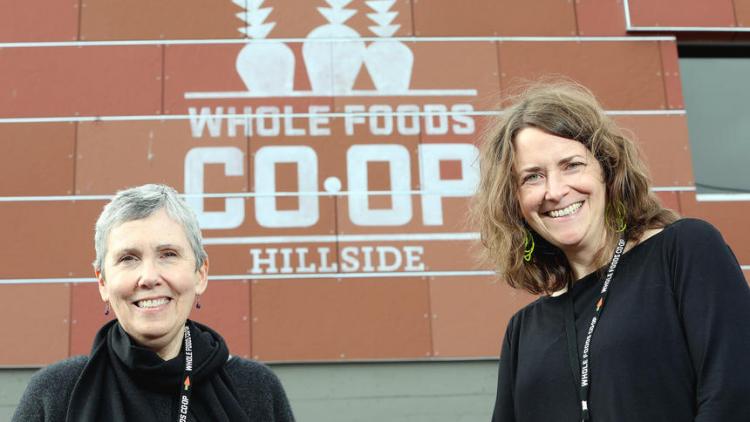New Leadership, New Challenges for Whole Foods Co-op

When Sharon Murphy was cleaning out the tiny produce display at a former Whole Foods Co-op location in 1993, she found a sign that today might seem shocking: organic tomatoes, $10.99 a pound.
"But they sold," said Murphy, who has been the co-op's general manager since 1988. "For a long time we were the only place to get organic produce. Now organics are in every grocery store, Wal-Mart and Target."
Which leaves a whole new mission for the co-op's' second general manager: Reinvention.
"Being a natural grocer isn't enough anymore," Murphy said.
After 36 years with the co-op and nearly 30 years as general manager, Murphy is retiring and leaving behind a legacy of expansion many businesses would be lucky to emulate. Her successor, Sarah Hannigan, was chosen by the co-op's board to keep up that growth and connect with the community in new ways.
"We're positioned well for continued growth in owners and sales," Hannigan said. "Sharon has built an amazing foundation for the community."
Murphy's last day with the co-op was Friday, and by the time the ink dries on this story she'll be halfway to Oregon to be closer to her 3-year-old grandson, Declan. For the past year, it's been an open secret Murphy would retire, and it was Declan that finally gave the 70-year-old the push she needed to move to the next chapter of her life.
"I've come to realize I like change," Murphy said.
Hannigan, 44, was previously the store manager at the Hillside location and brings a background in environmental studies, sustainable development and affordable housing as well as a stint running a farm-to-table restaurant in Santa Fe, N.M. Her new role allows her to take all that experience toward a big, singular goal.
"What we excel at is being a grocer, but being a co-op we are owned by the community and have a mission to serve the community," Hannigan said.
Hannigan was chosen following a national search by the co-op's board of directors.
"Hiring a general manager is the single most important thing we can do," said board president Jean Sramek. "We were lucky we were able to have a lot of time to prepare for the transition and do a national search, and we were even luckier we were able to find the perfect candidate here in Duluth."
Before Murphy became general manager, the co-op had run on a collective management system since its founding in 1970. That was during the days when Murphy would work a 12-hour shift and only be able to take a break when an owner stopped by the store.
Today the co-op has 135 employees, two locations and $18 million in sales. So a few things have changed that might require a more traditional management hierarchy.
But perhaps the biggest changes are yet to come as Hannigan takes the helm and the co-op redefines its identity moving forward.
"We've been so successful we're in danger of putting ourselves out of business," Murphy said, pointing out again that organic foods are no longer a specialty market — they're everywhere, and that drives prices down. Those $10.99 organic tomatoes, or about $18 in today's dollars, now run under $1.99 a pound, which can be tough on farmers.
Hannigan welcomes the challenge and said she'll continue to push for new owners — Whole Foods currently has nearly 10,000 — while getting to better know the community she's called home for the past decade.
"Many people join the co-op for different reasons," she said. "I'm looking forward to getting to know the needs of the community."
The management transition comes as some employees are trying to organize a union, to which Hannigan offered a neutral response.
"Our co-op fully supports employees' right to organize," she said. "Our owners, our board can't make that decision. Only the employees can."
Other challenges include ensuring access to healthy food for low-income neighbors and keeping competitive as bigger stores undercut organic prices — something Whole Foods' membership in the National Co-op Grocers association is helping with its network of lower-cost products.
The incoming and outgoing managers also point out the Hillside store's sales have slowed in the wake of construction on East Fourth Street, though Hannigan says the work will be well worth the wait as trees and other landscape features complement the co-op's footprint.
While that store has been a neighborhood fixture for more than a decade, the Denfeld store opened in March and is just starting to become imbedded in the community.
"We're all invested, we're all interested in the co-op being the best it can be," Hannigan said. "What are the community's ideas to make the co-op the best it can be?"
Being present in the community will mean more than offering healthy food and connecting local producers to a local market. While there are many ways that could manifest, Hannigan said she's been relying on a Japanese proverb to frame how she'll take on the future of Whole Foods Co-op.
Brooks Johnson Oct 17, 2016
"None of us is as smart as all of us."
Duluth News Tribune







